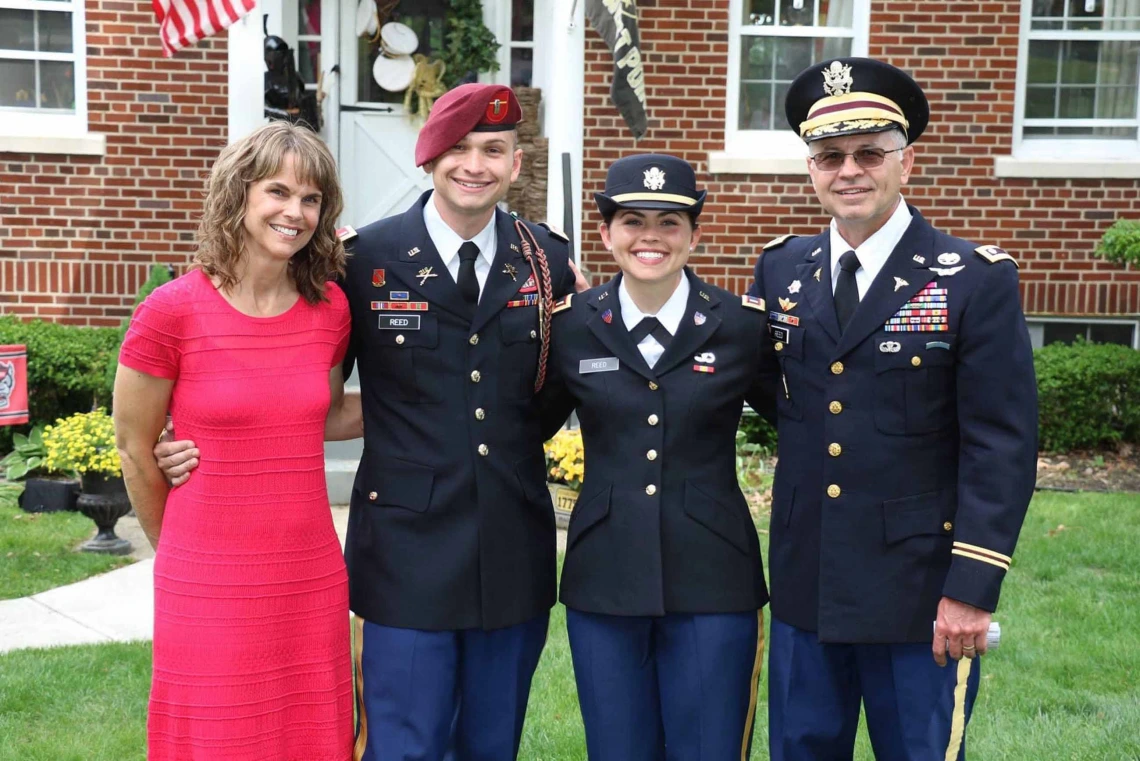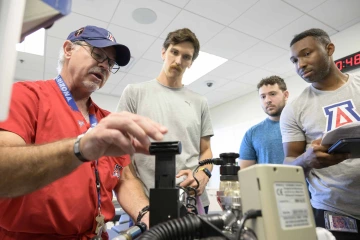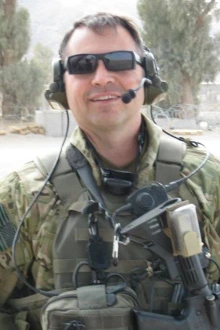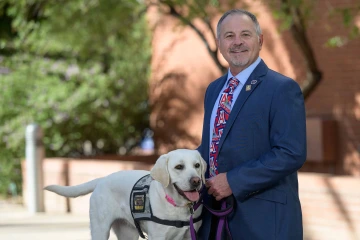Nursing’s Reed goes from combat vet to classroom instructor
Army veteran, drawing on 14 deployments over 27 years, teaches nurse anesthesia students to prepare for anything.

Jim Reed, DNP, CRNA, right, an associate clinical professor in the University of Arizona College of Nursing, celebrates with his family, from left, Holly, Nick and Heather at Heather’s commissioning from the U.S. Military Academy at West Point in 2018.
Photo courtesy of the Reed family
It’s hard to spend time with James “Jim” R. Reed, DNP, CRNA, and not feel admiration and gratitude for his dedication, service and sacrifice for the country.

James “Jim” R. Reed, DNP, CRNA, demonstrates a simulation exercise at the Arizona Simulation Technology and Education Center for a group of Nurse Anesthesiology Doctor of Nursing Practice students.
Photo by Kris Hanning, U of A Health Sciences Office of Communications
Yet Reed, an associate clinical professor in the University of Arizona College of Nursing’s DNP-Nurse Anesthesia Program and a 27-year Army veteran with 14 combat deployments, offers nothing but gratitude in return.
“It is right to honor and reflect on those who came before us in securing our way of life, liberty and freedom,” Reed said of how to honor veterans on Nov. 11, Veterans Day. “We should all strive to be the kind of Americans worthy of that sacrifice.
“Personally, I owe the Army and American taxpayers a huge debt of gratitude for the opportunities that I took full advantage of, including attending the U.S. Army Graduate Program in Anesthesia Nursing and becoming a Certified Registered Nurse Anesthetist, which made me who I am today and set the stage for the rest of my life and career.”
Reed, who joined the College of Nursing faculty in 2021, enlisted in the Army and served in a Special Forces unit out of high school. He then served in a National Guard Special Forces unit while in nursing school at the U of A. After earning his Bachelor of Science in Nursing in 1992, he went back on active duty, ultimately serving on a Special Mission Unit surgical team supporting elite special operations forces conducting counterterrorism missions in Iraq, Afghanistan and other countries in the Middle East, Northern Africa and the Horn of Africa.
Jumping into action
During his 27 years in the Army, Reed took part in hundreds of missions with his medical team providing far forward medical support and point of injury care rendering aid to wounded soldiers before they were extracted for additional medical care.
One of those missions, which was the first successful rescue of an American prisoner of war since World War II and the first ever of a female soldier, will likely sound familiar to those who remember the 2003 U.S. invasion of Iraq. During the first days of the invasion, Pfc. Jessica Lynch and her convoy were ambushed by Iraqi forces. Lynch was seriously injured, and 10 U.S. soldiers were killed. Lynch and seven others were taken as prisoners of war by the Iraqis. Pfc. Lori Piestewa, a soldier from Arizona and a member of the Hopi Tribe, later died from her wounds while in captivity. Piestewa Peak in the Phoenix area is named in her honor.
“I was part of the team that medically supported the mission to rescue Pfc. Lynch,” said Reed. “During this mission, I met and became friends with ASU grad and former Arizona Cardinals football player Pat Tillman. We ribbed each other a lot about being Wildcats and Sun Devils.”
Tillman played four years in the NFL before joining the Army in 2002 after the Sept. 11 terrorist attacks. He was killed in Afghanistan in May 2004 by friendly fire.
Reed, who retired from the Army in 2011 as a lieutenant colonel, said the most rewarding part of his military service was getting to know the people he helped bring home.
“On my 40th birthday, I took care of a critically wounded special operator, and our team managed to save him,” said Reed. “He reaches out to me every year to thank me. This year, he reached out and said he was cooking dinner with his son, and if it weren't for us, it would have never happened.
“Another soldier who was critically wounded on Veterans Day in 2006 has become a great family friend, and we have gone to seven Army-Navy games together.”
From the battlefield to the classroom

Jim Reed in Farah, Afghanistan, in 2010 on an airfield where they were preparing an aircraft to support a mission later that night.
Photo courtesy of the Reed family
Reed approaches teaching in the CRNA program the same way that he prepared for missions — by gaining mastery of the fundamentals.
“I will never not be a soldier, and I approach my job with the same seriousness about preparedness and high expectations as if I am preparing to go on a mission,” said Reed. “My hope is my students learn that there are many ways to do anesthesia, and ideal conditions are often not possible, so master and stick to the basics and their future patients will benefit.”
As it turns out, that approach works well with the CRNA cohort, many of whom have military backgrounds.
“There’s a unique connection that comes from having been through similar challenges, particularly in special operations and combat environments,” said Matthew Saunders, a Marine Corps veteran in his second year of the CRNA program. “The adversity we faced in deployments, the mission-driven focus and the ability to stay calm under pressure — all of that translates into the anesthesia field. Dr. Reed understands these principles firsthand, and that shared experience brings an immediate sense of trust and camaraderie. Having an instructor with that kind of perspective is invaluable in a program like this.”
Saunders noted that two other leaders in the college’s CRNA program are also veterans, and their military backgrounds are, in part, why he chose the U of A program. Army veteran Kristie Hoch, DNP, CRNA, is an associate clinical professor and a CRNA program administrator, and Air Force veteran Christopher Herring, DNP, CRNA, is an assistant clinical professor and an assistant administrator in the CRNA program.
“It has been very special to come home to do this important work at the College of Nursing,” said Reed, a native of Tucson. “I have a fantastic leadership team in Hoch and Herring, who have mentored and allowed me to flourish as a faculty member in the program. As they are both veterans, they understand the regimented style I have and the importance of academic rigor.”
Family and service
It was in nursing school that Reed met his future wife, Holly, a nurse and adjunct instructor at Pima Community College. Their two children, Nick and Heather, faced challenges growing up in a family where their father spent years away from home on deployments or in training, often missing birthdays and holidays. Yet they are incredibly proud of his service. Ultimately, both followed in his footsteps.
“I never considered joining the Army until my junior year of high school, when I overheard a phone call between my father and a friend of his who was about to deploy,” said Heather Reed, a graduate of the U.S. Military Academy at West Point and a retired first lieutenant now in her third year of law school at the U of A.
“His friend called to express gratitude to my father for saving his life during a previous deployment and for all his support over the years. Hearing the bond between them was both inspiring and incredibly moving. Realizing the profound impact my father had on others — saving countless lives during his deployments — inspired me to be part of something greater than myself. I’m incredibly proud to be his daughter.”
Nick Reed, an Army captain who recently transitioned to the Army Reserves after 12 years of active duty, said, “I don’t know of anyone who loves this country more than my dad. Even after leaving the Army, he has continued to remain active in veterans’ groups and outreach programs that help service members. I’m very proud of everything that he has accomplished, and he’s a great role model.”

Reed brings his dog, Jenny, to the Tucson campus occasionally to let students benefit from her calm, stress-reducing presence. Reed named the dog after an Army nurse he served with, Capt. Jennifer Moreno, who lost her life in Afghanistan.
Photo by Kris Hanning, U of A Health Sciences Office of Communications
How to say “thanks”
All three Reed veterans encourage us to speak up and thank those who have served our country this Veterans Day.
“Simple gestures, such as asking veterans about their experiences or thanking them for their service, may seem small but mean everything to them,” Heather Reed said. “Many veterans struggle with post-traumatic stress and acknowledging their experiences can be instrumental in their healing process.”
Jim Reed also sees Veterans Day as a time to recognize that as a nation we have far more in common than what separates us.
“I love Veterans Day as a day of honoring service going back to our country’s founding,” he said. “It is a day to honor all of those who wrote that blank check with their lives to defend the nation, our ideals, and our way of life. We come from diverse backgrounds and have different beliefs and customs, and we make it work while engaged in common purpose. In the process, we serve as an example to all our citizens that our commonalities and shared love of country far outweigh any differences we may have.
“My hope is that each American recognizes that to honor veterans is to live a life worthy of that sacrifice.”

